14
JulInternational Womens Day : Flat 30% off on live classes + 2 free self-paced courses - SCHEDULE CALL
Do you know, most US universities teach Python as an introductory programming language? And it is the 4th leading programming language after the classic languages like Java, C & C++.
Why did Python get so famous?...
Python became that star kid as it’s versatile, robust, easy-to-adapt for both beginners & professionals. Python is written in pure English doesn’t have that fumbling syntax and thus, gives you an easy time doing something constructive with it.

Python alone or with a combination of other languages is quite powerful & this is the reason why major companies like Google, Dropbox, Spotify, Netflix, Amazon can’t keep their hands off this language; for software development or data analysis-related tasks.
Learning Python is a very soluble choice if you love programming and want to complete autonomy to build any type of application or conduct innumerable data analysis tasks. But being skilled in this proficient language isn’t just enough in times like today. Even coding languages these days need certification to verify your truest potential & skills, ever since business complexities have doubled & competition in the work industry has become fierce.
So is there a Python certification? Yes, there are a few recognized Python certifications to ace & glorify your ultimate potential in the coding world.
Python certifications are the benchmarks that test your extreme knowledge around computer programming & more especially object-oriented programming. These certification exams are conducted by authorized bodies, whose names are quite popular in the job market. Thinking of becoming a certified Python professional? Continue reading, as in the following Python certification path, we will help you distill the:
|
Python Certification Types |
PCEP (Certified Entry-Level Python Programmer) |
PCAP (Certified Associate in Python Programming) |
PCPP1 (Certified Professional in Python Programming 1) |
PCPP2 (Certified Professional in Python Programming 2) |
Microsoft Technology Associate 98-381: Introduction to Programming Using Python |
|
Python Certification Cost |
USD 59 |
USD 295 |
USD 195 |
USD 195 |
USD 127 |
|
Exam Duration |
45 Minutes |
65 minutes |
65 Minutes |
65 Minutes |
45 minutes |
|
No. of questions |
30 Questions |
40 questions |
40 Question |
40 Questions |
40 Questions |
|
Exam Format |
Single-choice, and multiple-choice questions, drag & drop, gap fill |
Single-choice and multiple-choice questions |
Single-choice and multiple-choice questions, gap filling, drag, and drop |
Single-choice and multiple-choice questions, gap filling, drag, and drop |
Drag & drop, a selection from the drop-down list, single-choice, and multiple-choice questions |
|
Delivery Mode |
Online through OpenEGD Testing Service |
Online through Pearson VUE & Offline through Pearson VUE testing centers |
Pearson VUE Test Centers |
Pearson VUE Test Centers |
Online with Pearson VUE & offline with certiport testing centers |
|
Passing score |
70% |
70% |
70% |
70% |
70% |
|
Concepts Tested |
|
|
|
|
|
|
Exam Language |
English |
English |
English |
Englsih |
Chinese (Simplified), Chinese (Traditional), English, French, German, Japanese, Korean, Portuguese (Brazil), and Spanish |
|
Exam Retake Policy |
Can retake the exam 15 days ahead of the failed exam. No restriction on times of reappearance. |
Can retake the exam 15 days ahead of the failed exam. No restriction on times of reappearance. |
Can retake the exam 15 days ahead of the failed exam. No restriction on times of reappearance. |
Can retake the exam 15 days ahead of the failed exam. No restriction on times of reappearance. |
You get 5 attempts to clear the exam. You will have to wait 24 hours to take the first re-attempt. |
Let’s get into the details of python certification for beginners & advanced professionals!
PCEP (Certified Entry-Level Python Programmer) is a recognized Python certification for beginners and entry-level professionals that tests your ability to perform coding-related tasks with Python. This exam validates your knowledge around universal concepts of computer programming, Python language syntax & semantics, solving implementation challenges with Python Standard Library.
PCEP certification is an interim step to pursue further study, advanced certifications, and launch a career in programming, development, or related technologies.
PCEP (Certified Entry-Level Python Programmer) Certification Exam Details
Skills Measured -
Retake Policy -
You can retake the PCEP certification exam 15 days after the failed exam. Also, there is no limitation on the number of times you can reappear for this exam.
The PCAP (Certified Associate in Python Programming) is a certification that acknowledges your skills around python coding techniques, object-oriented programming - its fundamentals & notions.
The exam validates your knowledge around general computer programming concepts as: language syntax, loops, conditional execution, runtime environment, object-oriented programming, general coding techniques & more.
This PCAP certification is the epitome of fact that you have acquainted all the knowledge required for Python 3 & are ready to start your career as a software developer.
PCAP (Certified Associate in Python Programming) Certification Exam Details
Exam code/version - PCAP-31-02 ( retiring, conducted with Pearson VUE,) and PCAP-31-03 (online proctoring, conducted through Pearson VUE/OnVUE)
Delivery Mode -
Online proctoring from Pearson VUE, and offline with Pearson VUE testing centers
Skills Measured -
For PCAP-31-02
For PCAP-31-03
Retake Policy -
You can retake the PCAP exam 15 days after the failed exam. Also, there are no limitations on the number of times you can reappear for this exam.
The PCPP1 (Certified Professional in Python Programming 1) is a credential that reflects your true understanding of the advanced perspective of features & classes of object-oriented programming.
The exam also aims to test your understanding around:
PCPP1 (Certified Professional in Python Programming 1) Exam Details
Skills Measured -
Retake Policy -
You can retake the PCPP1 exam 15 days after the failed exam. Also, there are no limitations on the number of times you can reappear for this exam.
The aim of the PCPP2 (Certified Professional in Python Programming 2) certification exam is to verify your knowledge around automating processes with Python and also of creating Python-related tools, frameworks & systems for businesses.
The certification introspects your understanding of testing principles & techniques, creating & distributing packages, design pattern fundamentals, IPC (interprocess communication), Python-MySQL database access, Python network programming & so on.
PCPP2 (Certified Professional in Python Programming 2 Certification Exam Details
Question Format -
Multiple choice, gap fill, drag-n-drop, single choice questions.
Skills Measured -
Retake Policy
You can retake the Python PCPP2 exam 15 days after the failed exam. Also, there are no limitations on the number of times you can reappear for this exam.
Looking for how to get python certification? Follow these quick steps to start scheduling PCEP, PCAP, PCPP1 & PCPP2 Python certification test online.
This is how to get python certification for PCEP, PCAP, PCPP1, PCPP2 offered by Python Institute.
Visit https://pythoninstitute.org/ and select the menu bar “Certification” there.
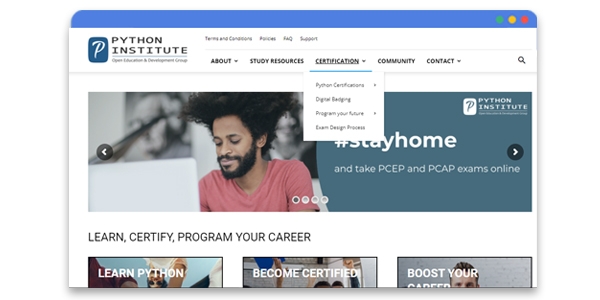
Then select the Python certifications from the drop-down & you will see different options for PCEP, PCAP, PCEPP (which includes PCPP1 & PCPP2 both). Select any of the preferred choices.
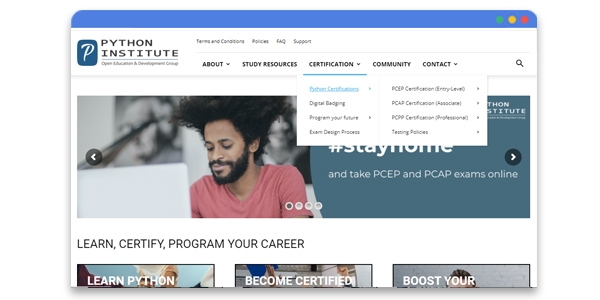
On opening any one certification type, you will be redirected to a landing page, wherein you will see a common button of “schedule exam”, standing out in mustard yellow color.
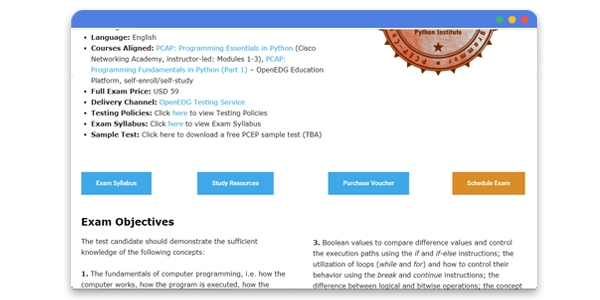
Click on the “Schedule Exam” button and you will be redirected to a different page of the OpenEDG learning & testing platform with a form asking your details. Fill it. And you will have your dashboard created, wherein you can manage your exam & see all the activities related to that.
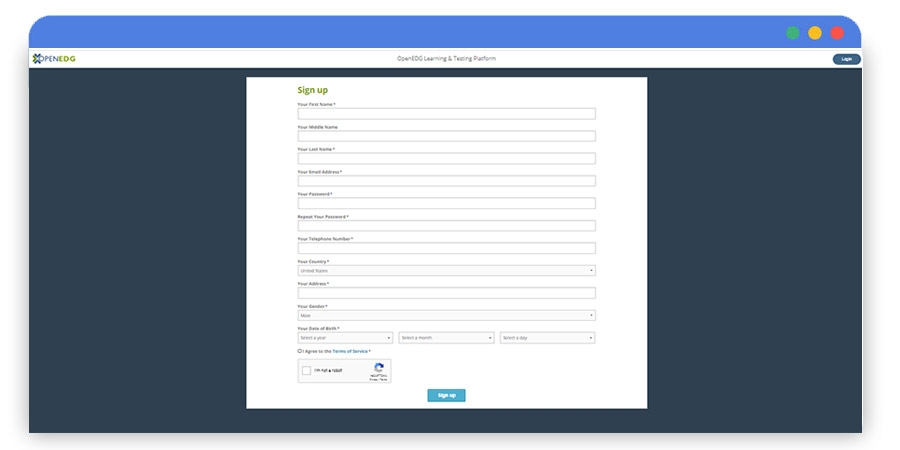
The Certification Exam 98-381: Introduction to Programming Using Python by Microsoft is conducted to assess & validate one’s knowledge around:
Prerequisite to take the 98-381: Introduction to Programming Using Python Exam:
98-381: Introduction to Programming Using Python Exam Detail
Question Format -
Drag & drop, a selection from the drop-down list, single-choice, and multiple-choice questions
Delivery Mode -
Online with Pearson VUE & offline with Certiport Testing Centers
Exam Language - English, Chinese, Japanese, Spanish, French, Portuguese, Korean, French, German
Skills Measured -
98-381: Introduction to Programming Using Python Exam Retake Policy - Candidates can attempt to clear this exam 5 times a year. After not securing the passing marks in the first exam, the candidate needs to wait for 24 hours to give the exam for the 2nd time. While attempting the 3rd time, the candidate must wait for 14 days. However, there is also a 14 days gap required between the 3rd & the 4th attempt and the 4th & the 5th attempt.
Where to apply for 98-381: Introduction to Programming Using Python exam?
Visit the link - https://docs.microsoft.com/en-us/learn/certifications/exams/98-381
On opening the link you will see two buttons named “Schedule with Pearson VUE” and “Schedule with Certiport”. Open any one of them & login to create a personal account. On doing so you will have your personalized dashboard, wherein you can manage your exam scheduling & other things related to it.
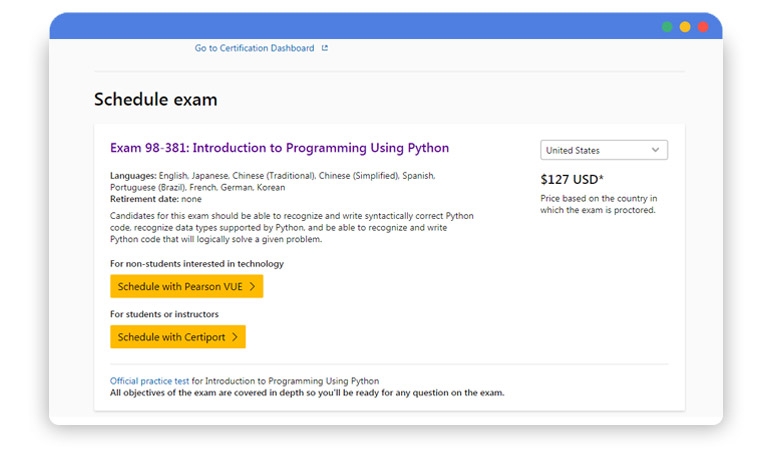
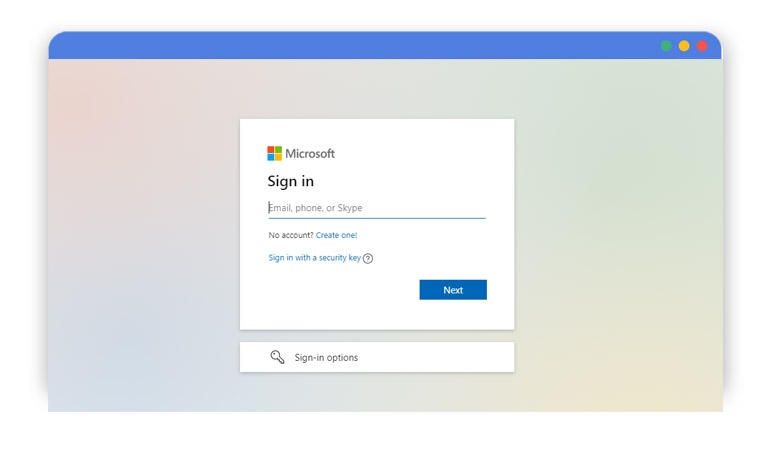
Now you know “ is there any Python certification”, let’s now help you realize the importance of having one.
Let’s learn some quick findings of IT certifications in general, before finding the benefits of Python certifications:
The Python ecosystem is realizing the worth & potential of holding at least one accredited Python certification, as owning them has as many as benefits as follows:

1. You can display your relevant coding skills & potential
Python certification exams test your practical approaches for handling a business’s real-time software development & data analysis problems. Once you procure the best Python certification online, you can prove your highest capabilities in applying the great skill set & learnings to solve any realistic software development & data manipulation challenges with ease.
2. You Get Preference Over Non-certified Python Coders
Python certification test online adds a positive weightage to your resume. It adds credibility to your candidature, displays your absolute knowledge for a role, and creates an image that any hiring manager would trust. The best Python certification test online makes your portfolio stand & highlights you as an ideal fit, before the non-certified Python coders. Thereby, increasing your employability chances within any software or data-centric company.
3. Sets You up with the Highest of Programming Knowledge
When you decide to prepare for the best Python certification online, you put a lot of effort to grab the best-in-class knowledge, by taking online classes, reading study guides, taking Python certification practice tests or so. Which down the line, makes you highly-knowledgeable about Python & object-oriented programming. Also, Python certification test online keep on getting renewed as per the latest versions of Python, so if you keep taking the renewed ones or advanced versions of the basic certifications, this will impact positively on your learning curve & growth opportunities.
4. Job Promotions are Not Just Daydream
If you are currently working as a technologist/coder in a different or similar language, you can easily apply for Python certifications to experience the next-best promotion opportunities. With clearing the best Python certification test online, you can easily convince the hiring managers about the highest level of knowledge you hold & the potential you can bring to the table, to draw out business complexities.
5. Juicy Paycheck from the Start Level
According to the survey, skilled & certified IT employees earn nearly “$5,439 (equals 9% more)” than non-certified ones. That means you are bound to get a higher package than the non-certified ones if you hold the best Python Certification online after a quick training. Currency, in the USA, the average python certification salary for developers is $111306, claims Indeed.
6. You Stay Unaffected in Company’s Cost-Cutting Scenarios
You know how labile the private tech or any job environment is due to seasonal spikes by an economic downturn or other such factors. In such heavy strides, companies cut loose the employees who don’t possess the highest of knowledge & appear to be a costly investment. But you are lucky if you hold the best Python certification online, as your valuable & authorized skills will be much-regarded by any organization to hold against such difficult situations.
7. Certification Can Make You Feel Content & Accomplished
Other than receiving the highest paychecks or job safety, by owning highly-recognized & best Python certifications online, you will feel self-accomplished and happy from within.
You will feel as if you have hit the ultimate milestone. Your treasure of validated knowledge will make you approach any part-time gig or full-time Python job opportunity with so much pride & confidence. You will feel limitless & empowered to step up into the world of computer programming or data analytics with ease.
8. You Can Pursue Your Own Gig
Who said you can only pursue Python Certification for a big job? Why not make use of talent, acquired knowledge to lay the foundation of something of your own? You can start your own firm, work as a self-owned or even as a freelancer. A Python Certification, you have no idea how it can help you believe in your skills, knowledge and put it to great use to build a viable career or business establishment.
It is still under debate whether you necessarily need a Python certification course/credential to become job-ready or not. But there are few companies that prefer hiring certified Python coders mainly due to the following reasons:
Anyone can apply for the Python Program, who has:
What if I haven’t done any technical degree?
If you haven’t achieved your degree in a technical discipline, it’s fine, you can still become a certified Python programmer. Doesn’t matter if you are a technical person or a non-technical one, you just need to have the zeal to learn and an effective Python Certification Training course online can help you obtain the right skills & knowledge.
Have you decided to sit for the above Python certifications online? Let’s help you prepare for them with some effective Python certification preparation tips suggested by experts as follow:
1. Get to Know Chosen Python Certification Exam’s Objective & Details
Get time to first understand the best Python Certification online you have chosen, its:
Find updated information from the above areas from the official website of Python institute, Microsoft, through peers who are also enrolling for the exam, colleagues, Python forums, etc.
Gathering such knowledge will help you make up your mind for what broad picture you need to expect & get ready for.
2. Identify the Mode of Learning & Study Materials
Select any one learning style - Self-study or Python Certification Course Online.
Some prefer self-study, while some prefer Python Certification Course Online. If you go for the second option, you will have smooth access to:
Going for a Python certification course online is actually important, especially if you are going for these certs the first time, as beginner levels are quite tough to get through & often require expert help.
Getting hands-on the right Python certification study guides & material is very important. If you are studying alone, ensure you have access to the best guides, books & study materials, that the exam demands. If you plan to get prepared with these Python training platforms online, you will be vested with accurate Python certification study or materials as Quizzes, question papers, industrial assignments, eBooks, PPTs, whitepapers, which actually teaches you the concept often asked in the Python certification exam of your choice.
If you plan to take our accredited Python certification training course, we will not just help you with Python certification preparation, we will as well help you with Python interview preparation & resume feedback end-to-end.
3. Make a Dedicated Study Timetable
Regardless of whether you choose to study yourself or via some training platform online, you do need to have a dedicated learning timetable. Identify the hours, days & time limit you will study to avoid overburdening yourself.
If you are taking the online classes, make sure you do have time to revise & learn separately, as this will help you grasp the taught concepts more effectively.
4. Keep on Taking the Real Python Certification Practice Test/Dumps
Just practice, and apply your gathered knowledge over the previous Python certification practice test or exam dumps, which you can easily get online. And if you are studying online, your trainers will conduct the mock tests timely, based on real-time Python exams, to examine your knowledge.
You know the best part about learning online is, they conduct mock tests, just like real certification exams. Types of questions, mode of exam, time duration are all quite similar to real ones. This makes you head-on prepared for the real-time exams, which is quite not possible when you are self-studying.
We are currently running some exclusive discounts, easy instalments & a scheme of enrolling now pay later, check out now!
Some Other Tips to Prepare for the Python Certification Exams!
If being in a Python career seems challenging, our free career counselling can help you explore more career choices in IT & Management along with their dedicated training courses. Try us!
1. Is Python Certification worth it?
Yes, python certification is worth it if you are looking for splendid career growth opportunities in computer programming & data analysis. By owning any Python certification after professional training, you can show your worth to the hiring managers. Hiring managers will see you as a verified resource, which will add to your heavy paycheck & job promotion opportunities. Not just in software development, a python certification is worth it if you want to unlock opportunities in machine learning, data analysis, visualization & more related fields.
2. What is Python certification?
Python certifications are the credentials or exams that test your proficiency around Python & object-oriented programming. You are tested by highly authorized bodies for this, and which often requires additional training support to brush your competent skills & knowledge. Looking for one such training platform? Or not sure of going for such? How about going for a Python certification free demo class first?
3. Who I can become with Python Certifications?
After conquering the Popular Python Certifications, you can choose to become a:
4. Which certification is best for Python?
It’s quite difficult to answer “which certification is best for Python”. But currently, there are 5 trending Python certifications offered by Python Institute & Microsoft:
5. What is the cost of Python certification?
The Python certifications cost as follows:
6. What is the python certification syllabus?
To check out the Python certification syllabus & get complete Python certification study guide details, get here!
7. Which is the best python certification for beginners?
If you are just starting in the programming world, we will suggest taking the PCEP (Python Certified Entry-level programmer) certification, as this python certification tests your basic understanding to write, implement & debug codes of Python and can help launch your career as a Python programmer instantly.
You need formal training to clear this cert, as python certification entry levels are quite tricky to get through. Not sure of the training, how about a python certification free demo class?
8. How to pass the Python certification test online?
9. How hard is Python Certification?
Python is very flexible & easy to learn language that doesn’t make it very difficult to achieve the certification. With an effective Python certification training course online of 6-8 weeks, you can easily prepare for the desired certifications.
For complete Python Course and Certification guidance, or to yourself find out how hard is Python certification, we suggest trying our Python certification free demo class.
Python is one of the best coding jobs you can be in & launch your career around software development, testing, data analysis & more. Python programmers are highly needed by tech companies, especially the skilled & certified ones.
Hiring managers are relentlessly recruiting certified Python programmers, who could help them establish robust applications and data structures for more business effectiveness & efficiency. If you add any one of the above Python certifications as PCEP, PCAP, PCPP1, PCPP2, or Microsoft Technology Associate 98-381 to your resume from python institute or Microsoft, you will:
Don’t just keep thinking “is Python certification worth it” or “is Python certification useful”, because they are worth it & useful for your career trajectory. Enrol for the required Python Certification Course online and become fully prepared for these discussed prominent Python Certifications online.
That’s it, yay, you have been a great reader! In the above sections, if we missed out on any of your queries related to Python certification path, python certification study guide or Python certification online course-related concerns, feel free to pique our interests in the comments section below.
 Pinterest
Pinterest
 Email
Email
With fact-finding market research & solicitous words, Nandita helps our digital learners globally navigate their way to profound career possibilities in IT and Management.

Cyber Security

QA

Salesforce

Business Analyst

MS SQL Server

Data Science

DevOps

Hadoop

Python

Artificial Intelligence

Machine Learning

Tableau
Search Posts
Related Posts
Receive Latest Materials and Offers on Python Course
Interviews